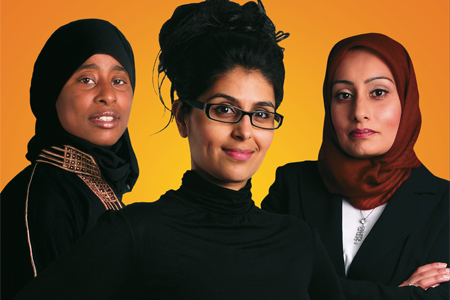
The League of Extraordinary Women
(This article was first published in issue 47 in August 2008)
At a time when the media spotlight glared on women for all the wrong reasons, there are many individuals beyond stereotyped headlines who are busy making a difference in the world. Back in August 2008 (for issue 47), Myriam Francois-Cerrah met the talented and inspiring individuals, ordinary women with extraordinary skills, and applauds the efforts of our British Muslim pioneers.
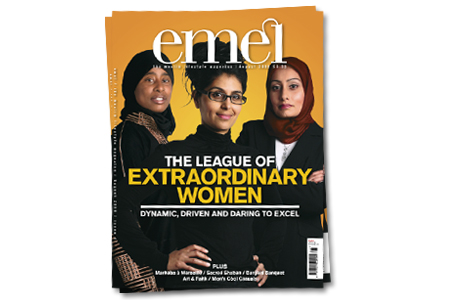
Anisah Mckenzie
Homemaker & Wing Chun instructor
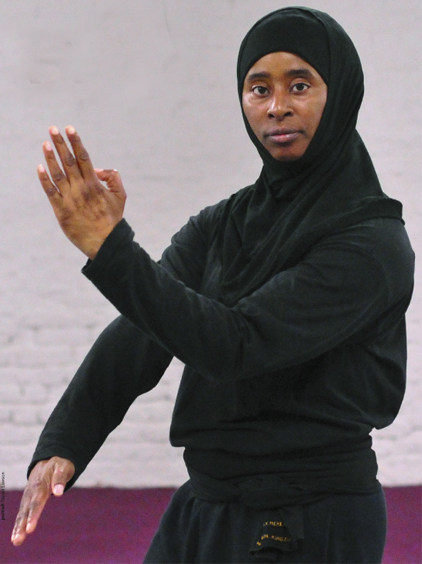
What do you do and how did you get to where you are today?
I am a revert Muslim from a strict Catholic, Caribbean background. From the age of 16, I embarked on a spiritual journey to find the truth, dipping in and out of a number of belief systems.
Having studied Fine Art, I went on to work in primary schools, spending the last few years working in failing schools, turning them around. During my penultimate year, I became a Muslim, inspired by some year six students
Today I am what society calls a homemaker, a Simo (literally Mother Teacher) in Kung Fu, and the first Muslim woman to complete all four gradings of the Wing Chun system under my husband, Sifu Garry McKenzie. On entering the school I was confronted with men who really did not want to train with a woman. This spurred me on although now I realise there was no need to compete with the men but to be the best a woman can be.
What do you love most about what you do?
The image of women, particularly of Muslim women, is often unfavourable, portraying us as weak individuals who stay at home, doing nothing. What I love about doing Wing Chun is that it encompasses the whole person, developing your personal and interpersonal skills whilst fundamentally equipping you with the tools to be confident and to be able to protect yourself and those around you.
What drives you?
I am driven by my love of Allah and my love for Islam
What or who inspires you?
Studying about the deen and about the Prophet, peace be upon him, and his tolerance, forbearance, patience and perseverance. His strength has inspired me to insha’Allah inspire Muslim women to have more presence in society
What advice would you give to a younger you, starting out?
The world is a vast place with many challenges in it. Knowing what I know now, I say all you sisters: gain knowledge and remember Allah in all you do. Be generous with your time in helping others, spread the word of Islam and follow the way of the Prophet. Learn to protect yourself as it is a sunnah of the Prophet.
What obstacles have you faced?
As a Muslim, my greatest challenge was wearing the hijab. Now I love my hijab and I make every effort to use my martial arts to bridge the cultural diversity by teaching all women.
What is your greatest ambition?
To be a good Muslim, God willing, to continually strive to submit to Allah and to dispel the myth that Muslim women are weak and oppresse.
Is there a need for Muslim female role models?
There are already many positive Muslim female role models but we need to do more by rooting out those who are already brilliant wives, mothers, sisters, daughters and teachers.
Razia Iqbal
Arts correspondent, BBC News
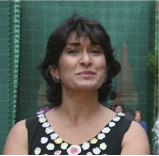
What is your background and how did you get to where you are today?
I began my BBC career at the World Service in 1989, reporting from Pakistan. In 1993, I became a senior producer at Radio 4, working on the main arts in Sri Lanka. On my return to London and since, I have worked as an arts correspondent.
What do you love most about what you do?
Meeting some of the most creative and interesting people and conveying sometimes complex ideas to a general audience
What advice would you give to a younger you, starting out?
Cultivate your instinct for what makes you happy. Don’t pursue what you think others expect of you. Have faith in your abilities, but be honest about your strengths and weaknesses. Aim high, don’t ever give up!
What obstacles have you faced?
A career in the media is very competitive, and there will always be obstacles. You make your own luck.
Is there a need for Muslim female role models?
Everyone needs role models and female role models are never a bad idea. Women tend to work in a collaborative, nurturing way, more instinctively than men.
Yara El-Sherbini
Artist/Comedian
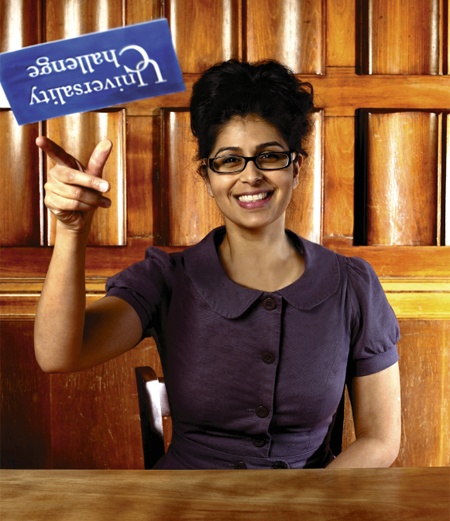
What is your background and how did you get to where you are today?
I was born in England of an Egyptian father and mother from Trinidad and Tobago. I grew up in Pontefract, and moved to London five years ago to study for an MA in Fine Art Media from the SLADE, UCL. I now show my work nationally and internationally.
I’m an artist and my practise uses humour and popular culture to playfully explore contemporary social and political issues, in the hope of probing ideas, while questioning what art is and can be. I think I am where I am due to hard work and motivation, but mainly because I am driven by the idea that art can change the world, particularly through debate and dialogue. Maybe I’m changing it right now, maybe because you’ve read this you’ll help an old granny across the street tonight!
What do you love most about what you do?
I love the diverse projects and commissions I get to develop, making my ideas become real; from developing a one-hour game show called ‘Universality Challenge’, where I explore universal experiences, to touring ‘A Pub Quiz’ [a subversive quiz that explores art and life] around the UK and Australia. I’ve written a joke book called Sheikh ‘n’ Vac, and perform stand-up comedy as part of my practise. I’m now developing bespoke and rather funny and politically engaged Treasure Hunts around galleries and museums. I love making people laugh, which is really used as strategy to engage people with my politicised approach to art making. It’s the most exciting job I could wish for, and I’m very thankful for that.
What drives you?
I’m driven by the idea that art can facilitate change, and also by my passion for exploring what art is and can be. By pushing the boundaries of what we can consider as art, I’m experimenting with how we engage people and relational aesthetics.
What or who inspires you?
I’m inspired by my family, and by people who fight for what they believe in and by those who accept how the world is. Art inspires me, specifically art that talks about the now, about real issues that affects us all. I especially love the work of the artist Emily Jacir.
What advice would you give to a younger you, starting out?
Always find ways to improve your work and build on experience. If something doesn’t go well, don’t give up. See why it didn’t work and improve it. Also don’t rush – working in the art world is not a race, it’s a marathon.
What is your greatest ambition?
My greatest ambition is to make art more accessible and open ideas of what art might be. It’s also to open up ideas about how we understand Islam, particularly to a younger generation of British Muslims, many of whom struggle with how to integrate the multiplicity of their identities with their lives, often at the cost of losing their faith.
Is there a need for Muslim female role models?
I believe there is an urgency for strong and positive Muslim female role models, not only for young people to identify with, but also to actively engage with how we are represented and how we represent ourselves.
Shaista Aziz
Aid worker, journalist and founder of Urban Scribe Media
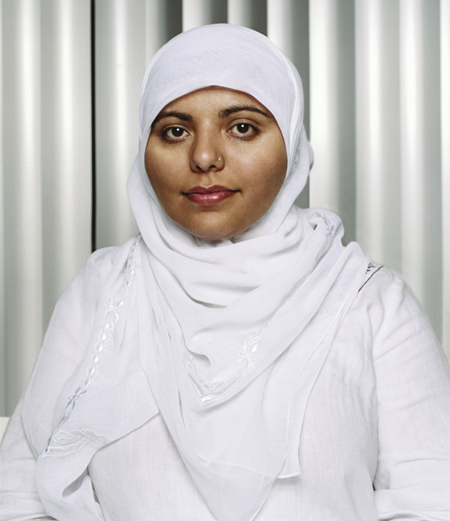
What is your background and how did you get to where you are today?
I am a British Pakistani, who after studying my BA in English Literature and Women’s Studies, ended up working as a broadcast journalist/ producer for the BBC for five years. I’ve also worked as a radio reporter on BBC Radio Dorset and as a newsroom journalist at Al Jazeera News Channel, in Doha.
I’ve been working as a media specialist with international development agencies such as Oxfam, Save the Children, Islamic Relief, and the Baghdad based aid agency Doctors for Iraq. I specialise in working on humanitarian emergencies working with aid teams on the ground, reporting on the situation to increase public awareness and funds
What do you love most about what you do?
It’s a real honour and privilege to work with dedicated aid workers in the field, water engineers and other specialists. In Aceh, I worked with Oxfam engineers and the local community to help build a giant water storage tank as the survivors in the fishing community had fled to higher ground when the Tsunami hit and had no access to drinking water. We were able to organise a water truck to come into the area and fill the water tank. It was a very humbling experience to know that because of Oxfam, people would have access to water.
With my job I have the oppotunity of travelling a lot and have been fortunate to work in countries as diverse as Haiti, Iraq, Russia, Tajikistan and Yemen.
What drives you?
I’m driven by my belief – I have a strong sense of social justice and I try to learn from every situation I’m in and from every person I meet.
What or who inspires you?
The human spirit, the sheer will to survive. I’m very fortunate that I’ve met so many wonderful people over the past few years. I’m constantly humbled, moved and inspired by their dignity and strength. In Iraq earlier this year, I met a 75 year old man who had tied pieces of string around his jacket to hold it together. He was living in a filthy camp after being displaced by the war and sectarian violence. His 27 year old daughter had been widowed, her husband killed by militia, and she had two small children. The whole family were living in a small tent. He was so dignified, calm and hospitable but it was very hard to see him cry as he talked about the future his daughter faced as young single mother in Iraq.
What advice would you give to a younger you, starting out?
Be very determined, never give up and grow very thick skin!
What obstacles have you faced?
There will always be obstacles, the challenge is to rise above them and prove people wrong but not at the price of your health, happiness and sanity. Whenever I face difficulties, I seek out my friends and good people around me and they give me their perspectives and unconditional support which help.
What is your greatest ambition?
To contribute positively to society
Is there a need for Muslim female role models?
Definitely. There are so many misconceptions about Muslims out there. I believe there is a real need for youngsters to have mentors, people they can come to for advice and encouragement so that they can broaden their horizons and know that if you really want to do something and you are prepared to work hard, you will get there.
Wahida Shaffi
Project manager, Peace Activist and Educator
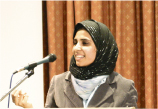
What is your background?
I have been a peace activist and educator in the community for over 10 years, working to have faith based identities recognised. I am a qualified social worker and completed my MA in International Politics and Security Studies/Conflict Resolution at the University of Bradford. I am currently the Project Manager for the Women Working Towards Excellence/Our Lives Project.
What drives you?
The Chinese expression “The glory is not in never failing but in rising every time you fall” has been a consistent affirmation in my life. This coupled with the poverty we witnessed growing up.
What or who inspires you?
My father’s strong work ethic and the courage and determination of my mother and sisters. Some of the giants of the world: Nelson Mandela, Maya Angelou, Aung San Su Ki and Shirin Ebdi.
What obstacles have you faced?
I was the first woman to go to university in my family, the first to travel and the first to pave a different route.
Is there a need for Muslim female role models?
I feel energised by the dynamism and leadership that women are generating towards positive social change. In the 21st century, a critical mass of women leaders on all levels have achieved positions of influence, yet we still have a considerable way to go.
Saida Ebrahim
Founder, Scrumptious Sweets
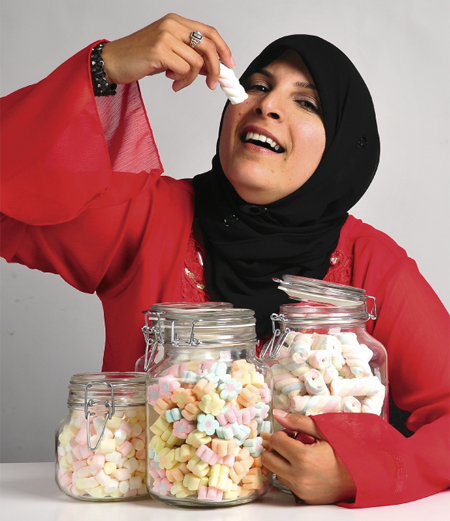
What is your background and how did you get to where you are today?
I was born in Tanzania, East Africa and was forced to flee to the UK in 1983 due to the ethnic cleansing occurring at the time there. I left with few ‘O’ levels, GCSEs, a diploma in computer programming, and a diploma in counselling. Amongst many recent achievements in which I feel most pride was winning the Best Business Idea Award, presented by Ruth Badger from The Apprentice. This followed my nomination in the Peterborough Enterprise Programme’s ‘Start Doing Something New’ competition, aimed at discovering would-be entrepreneurs.
My company is called Scrumptious Sweets, specialising in halal and vegetarian confectionery such as jelly sweets and marshmallows, and selling in the UK and branching further afield. Our products are available in shops as well as online.
What do you love most about what you do?
Sourcing new products, implementing new ideas and seeing the Scrumptious Sweets growing and changing directions everyday. The thrill of being in charge of decision making, reaping all the benefi ts of the hard work I put in and leaving behind a legacy for my children.
What drives you?
Knowing that I have built Scrumptious Sweets from an idea that occurred to me during family holiday and that it is now a successful business with great potential. In addition, the idea of having a business that will enable me to be in a solid financial situation, hence in a position to be able to help others improve their lives.
What or who inspires you?
My mum is my inspiration; my father died leaving six children aged between 15 and two years old. In Africa, there are no social benefi ts and therefore people have to rely on others to help. My mother was different in that sense, she built the family clothes business that my father left behind and she was soon in a position to help others.
What advice would you give to a younger you, starting out?
The advice I would give to a younger me, is not be too hard on yourself. Learn to celebrate your achievements and allow yourself to make mistakes as long as you learn from them.
What obstacles have you faced?
There are many obstacles, however one that stands out the most is sourcing the products worldwide, a product which meets all halal criteria as well as being of the best quality. It is especially difficult if the sourcing is from different parts of the world. However, it is not impossible to overcome these obstacles with perseverance.
What is your greatest ambition?
My greatest ambition is to help others who may not be as fortunate as we are. I think it’s too easy not to feel the pain of others suffering, when we live in such comfort and security. I would love to build schools in Palestine for the upcoming generation. And of course, to build my brand, Scrumptious Sweets, to be the best, most recognised and most trusted halal and vegetarian brand worldwide.
Is there a need for Muslim female role models?
I believe it is essential to have Muslim role models, especially in a climate where Islam is perceived and portrayed in the media as a religion which treats women as second class citizens. On the contrary, Islam values women and men equally in their own rights. Muslim women play a vital role in society, be it as successful business women or nurturers at home, or both!
Nasfim Haque
Assistant Producer, BBC World Service
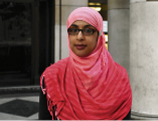
What is your background?
I was born in Cardiff, Wales and was encouraged to achieve and stand on my own two feet. I studied Natural Sciences at the University of Cambridge, and a PhD in Pharmaceutics at the University of Wales. I began as a trainee at BBC Wales in TV, radio and online production. Over the years, I’ve worked for Radio 4’s Woman’s Hour, made two films about being a British Muslim, developed ideas commissioned for BBC Two and am about to start my new job working for the BBC’s World Service Trust.
What do you love most about what you do?
The variety of our work and how we have to talk about and deal with real issues.
What advice would you give to a younger you, starting out?
Persist, have flair and don’t be afraid to be savvy. It’s ok to be witty in the way you tell people about your culture and religion – have some sparkle.
What obstacles have you faced?
Obstacles come from colleagues who try so hard to make you fit in that they say things like, “You don’t want to be making ‘muslim stuff’ all your life?!” People are different, get over it.
What is your greatest ambition?
To produce documentaries that tell the truth and rattle people’s brains
Is there a need for Muslim female role models?
There is certainly a need in the media for Muslim female faces who don’t compromise. It’s crucial we have more real practising British Muslims in this field. I wouldn’t mind seeing (or being) the first ‘scarfie’ on popular TV!
Sabin Malik
Commissioner, Women’s National Commission
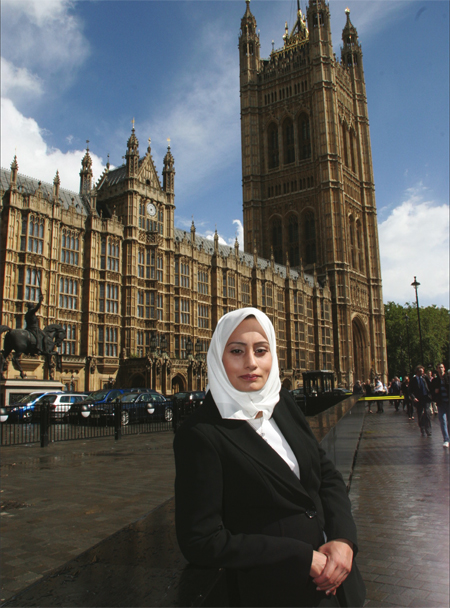
What is your background?
I work for the Women’s National Commission, which ensures that women’s issues impact government policy. I am Chair of the WNC Migration and Asylum Group, which highlighted key issues for the UN. I was recently appointed to serve the new National Muslim Women’s Advisory Group, launched by the Prime Minister. I am also a Community Cohesion Specialist and am leading the development of Hounslow Council’s first strategic plan on far right extremism, religious fundamentalism and community cohesion.
What drives you?
I am passionate about community issues and have been actively involved in voluntary work for the past 17 years. At 14, I visited the Berlin Wall and the Auschwitz Memorial Camp in Poland. The trip had a hugely profound impact on me and I pledged to dedicate my life to promoting equality, human rights and social justice.
What or who inspires you?
Islam drives me to be a pioneering person who can create change
What advice would you give to a younger you, starting out?
Life is very difficult and only Allah can give you the strength you need. Leadership can be uncomfortable, but feel the fear, be sincere and just do it.
What obstacles have you faced?
There is no doubt that as Muslim women we face many challenges. We also have to work incredibly hard to meet many responsibilities and roles.
What is your greatest ambition?
To be an Ambassador on the international stage and improve the lives of millions of people.
Ifath Nawaz
President, Association of Muslim Lawyers
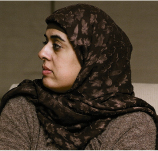
What is your background and how did you get to where you are today?
I was born in Kenya and arrived in the UK at two. I am a solicitor by profession, from a very ordinary and humble family. The turning point for me came at a high school assembly taken by a black female barrister who spoke about her struggles to get where she is today. That sparked a desire within me to pursue a career in the law despite the odds. In 1993 whilst on maternity leave, I was one of a number of co-founders of the Association of Muslim Lawyers due to the lack of a voice or proper representation.
What do you love most about what you do?
I am known for being extremely passionate about the work AML does. To be heard and to be recognised as a voice of reason is very rewarding and one we pursue with great rigour.
What drives you?
I really believe that this world can be just and fair to everyone despite their race, colour, religion or background. The more obstacles I face, the more determined I become. I was once asked by a very prominent lawyer whether the way Muslim women dressed was an impediment to integration and my response was that colonisation had ended and integration was a two way street.
What or who inspires you?
Undoubtedly the Prophet Muhammad for his endless qualities and his ability to be admired by his enemies. Ilama Iqbal for his wisdom and vision, Sarah Joseph for her hard work and dedication, and finally my mother for her ability to multi task 40 years ago with a large family in a foreign country.
What advice would you give to a younger you, starting out?
To be ambitious and not too cautious, to not accept the first offer of any kind and to have sought out the wonderful friends I have much earlier on in life.
What obstacles have you faced?
In the law, there are many times when one is thrown in at the deep end, but determination and faith help one to keep going and delivering. Also, realise that one really can make a difference.
What is your greatest ambition?
One is for the Association of Muslim Lawyers to be self financing with employed staff and a base in London where it can be a beacon centre for excellence and help to formulate policies. I wish to see Muslim women making huge strides in their personal lives and for the Muslim community to really turn around the malaise it is in.
Is there a need for Muslim female role models?
Most definitely. I can see the impact this has when I deliver workshops on Muslim Women – Natural Born Leaders as part of the Muslimah: Make a Difference Programme, an initiative I have put together with my colleagues at Faith Associates. Many Muslim women are unaware of the wonderful role models we have in Islamic history and the leading roles they played throughout Islamic civilisation – many are unaware of the role models that are living amongst us today!
Bookmark this |
|
Add to DIGG |
|
Add to del.icio.us |
|
Stumble this |
|
Share on Facebook |
|
Share this |
|
Send to a Friend |
|
Link to this |
|
Printer Friendly |
|
Print in plain text |
|

Comments
0 Comments